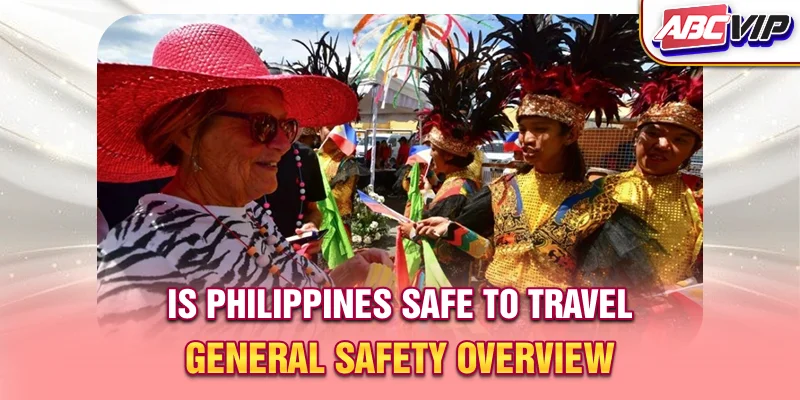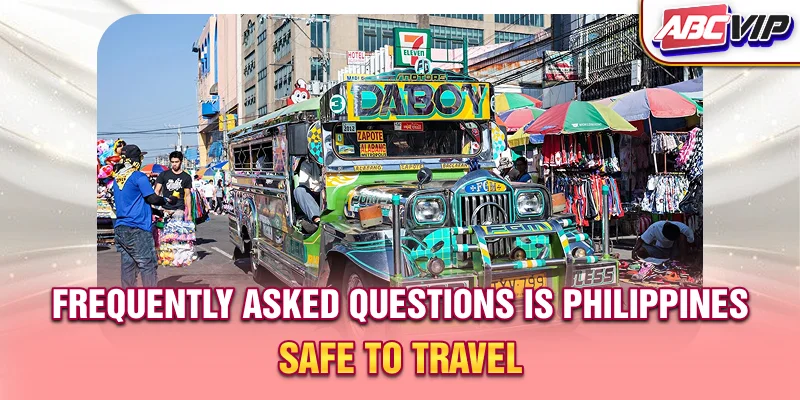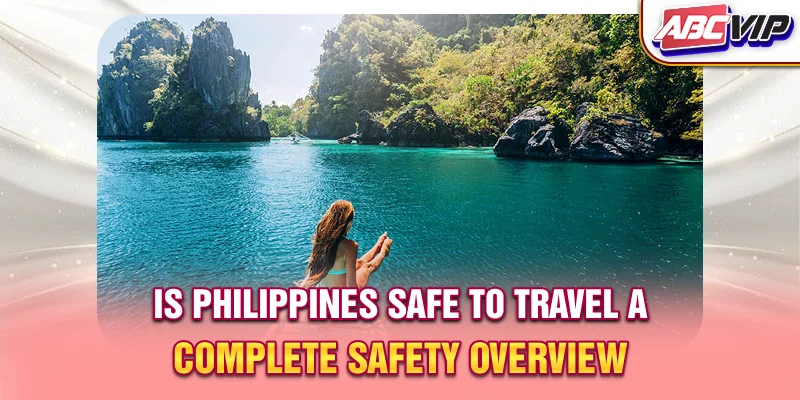Is Philippines safe to travel? As you plan your 2025 trip, it’s important to assess key factors like health, safety, and local conditions. While much of the country is tourist-friendly, some areas carry greater risk. This guide of ABCVIP offers insights to help you travel smarter and more safely.
General safety overview
Is Philippines safe to travel? This is a common question among tourists planning to visit the country in 2025. The Philippines remains a popular destination thanks to its beautiful beaches, rich culture, and friendly locals. However, the safety of your trip depends heavily on where you plan to go and how well-prepared you are.
Different regions present different levels of risk, and international governments have issued varying advisories to help guide travelers. Several key sources provide up-to-date information regarding travel safety in the Philippines:
- The U.S. Department of State currently urges American citizens to exercise increased caution throughout the Philippines. This recommendation is based on ongoing concerns related to crime, terrorism, civil unrest, and the risk of kidnapping. Additionally, specific areas such as the Sulu Archipelago and Marawi City are under a strict “Do Not Travel” warning, due to persistent threats from terrorist groups and armed conflict in these zones.
- The Australian Government advises travelers to maintain a high level of vigilance when visiting the Philippines. Their travel guidance highlights the elevated risk of terrorism and violent criminal activity, particularly in urban centers and areas with limited government presence. Australians are also warned to avoid participating in demonstrations or being near large public gatherings, which have the potential to become unpredictable or even violent.
- Canadian Government: Suggests avoiding all travel to certain provinces in Mindanao due to serious threats of terrorism, kidnapping and violent clashes.

Regional safety considerations
Is Philippines safe to travel? The safety of your trip largely depends on the specific areas you plan to visit.
- Mindanao: Parts of Mindanao, particularly the Sulu Archipelago, Marawi City, and surrounding provinces, are considered high-risk due to ongoing conflicts and terrorist activities. These areas are subject to military operations and have limited access for foreign nationals.
- Metro Manila and Major Tourist Destinations: Cities like Manila, Cebu, and Davao are generally safer for tourists. However, petty crimes such as pickpocketing and scams can occur, especially in crowded areas. It’s advisable to remain vigilant and take standard precautions.
Health and environmental risks
Is Philippines safe to travel? Health and environmental factors are crucial considerations.
- Health: The Philippines has faced outbreaks of diseases like dengue and COVID-19 in the past. Travelers should ensure they are up-to-date on vaccinations and take preventive measures against mosquito bites.
- Natural disasters: The country is located in the Pacific Ring of Fire and is prone to natural disasters such as typhoons, earthquakes, and volcanic eruptions. The 2024-2025 eruptions of Mount Kanlaon displaced thousands and disrupted air travel.

Travel tips for a safe visit
To enhance your safety while traveling in the Philippines:
- Stay informed: Monitor local news and official government advisories for updates on safety conditions.
- Avoid high-risk areas: Refrain from traveling to regions with active conflicts or high crime rates.
- Use reputable services: Opt for licensed taxis or ride-sharing services, and avoid traveling alone at night.
- Secure your belongings: Keep valuables in a hotel safe and be cautious when withdrawing money from ATMs.
- Respect local customs: Be aware of cultural norms and local laws to avoid misunderstandings.
Frequently asked questions
To help address common concerns, we’ve compiled key FAQs that travelers often ask when considering: Is Philippines safe to travel? These answers will guide you toward a more informed and secure journey.

Is Philippines safe to travel?
Is Philippines safe to travel? It varies based on where you plan to go. While most tourist-friendly places like Manila, Cebu, and Palawan are relatively safe with proper precautions, certain regions, especially in Mindanao, remain high-risk due to conflict and security threats. Always consult the latest travel advisories before planning your route.
What precautions should I take when traveling to the Philippines?
To answer is it safe to travel to Philippines now, taking appropriate precautions is essential. Stay updated on local news, avoid high-crime or conflict areas, and stick to well-reviewed accommodations and transport services. Respect local customs, stay alert in crowded areas, and ensure your personal belongings are always secure.
Are there health risks associated with traveling to the Philippines?
Health concerns are an important part of assessing is it safe to travel to Philippines now. While the country offers modern healthcare in urban areas, travelers should be cautious of dengue fever, COVID-19 variants, and other local illnesses. It’s advisable to get recommended vaccinations and take protective measures such as mosquito repellent and bottled water.
What are the best ways to keep informed about the Philippines?
Staying informed is critical when asking Is Philippines safe to travel? Regularly check travel advisory sites like those of the U.S. State Department, Australia’s Smartraveller, or Canada’s Global Affairs. You can also subscribe to government alert systems or follow local news for real-time updates on safety conditions.
What are the emergency contact numbers in Philippines?
Knowing who to call in a crisis is a key aspect of answering is Philippines safe to travel? For immediate assistance, dial 911 for police, fire, or medical emergencies. It’s also wise to save the contact details of your embassy or consulate, especially if traveling to more remote areas of the country.
Conclusion
Is Philippines safe to travel? While many parts of the Philippines are welcoming to tourists, certain areas pose higher risks due to ongoing safety concerns. By staying informed that ABCVIP alliance has mentioned, exercising caution, and adhering to travel advisories, you can make your visit both enjoyable and secure. Always prioritize your safety and well-being when planning your travels.




